GALLUP NEWS SERVICE
PRINCETON, NJ -- According to the latest CNN/USA Today/Gallup poll, half of all Americans continue to believe that unless Osama bin Laden is captured, U.S. accomplishments in Afghanistan cannot be considered successful. The same proportion of Americans expressed that view last January, down only slightly from the 55% who felt that way last November. Recent news stories that suggest bin Laden may still be alive and planning another attack apparently have not influenced public opinion on this matter.
| If Osama bin Laden Is Not Captured: U.S. a Success or Not a Success in Afghanistan? |
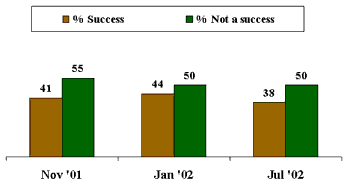 |
The poll, conducted July 5-8, also finds Americans uncertain about the success of the overall war on terrorism. While about four in 10 (39%) perceive the United States and its allies as winning the war, slightly more (43%) believe neither side is winning. Despite recent claims by al Qaeda operatives that their command and control capabilities are fully intact, only 16% believe the terrorists are winning the war. These numbers represent a slight shift in favor of the United States and its allies compared with results measured June 21-23 (33% perceived the United States and its allies as winning), but are still down substantially from last January, when 66% thought the United States and its allies were winning.
| Who Is Winning the War on Terrorism? |
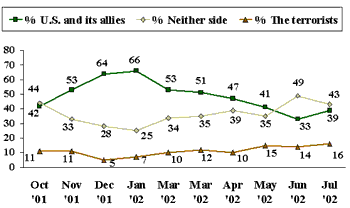 |
Majority Fear Further Acts of Terrorism Over the Next Several Weeks
More than half of all Americans continue to say that further acts of terrorism in the United States over the next several weeks are either very or somewhat likely to occur. While 56% currently express that feeling, the number is down from the 65% of respondents who felt that way in May, and far below the 85% who expressed that view during the height of the anthrax scare last October.
| How Likely Are Terrorist Acts in the United States in the Next Several Weeks? |
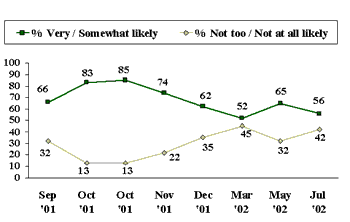 |
Few Americans believe the terrorist attacks will occur in their community. Just 17% say such acts are very or somewhat likely to occur, while 72% say they are not likely to happen. These views have varied only slightly over the three times they have been measured since last year.
| How Likely Are Terrorist Acts in Your Community in the Next Several Weeks? |
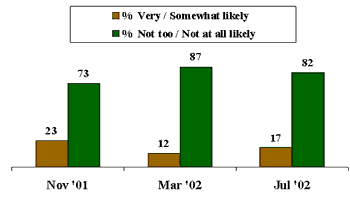 |
Attitudes on Success of War Highly Partisan
The poll shows that the public's response to questions on the success of the war on terrorism are highly related to political party orientation. On the question of success in Afghanistan, Republicans are evenly divided over the need to capture bin Laden. Independents lean by a 10-point margin toward saying that bin Laden must be captured , while Democrats express that view by a 2-to-1 ratio.
| Need to Capture Osama bin Laden to Have
Success in Afghanistan? Compared by Party |
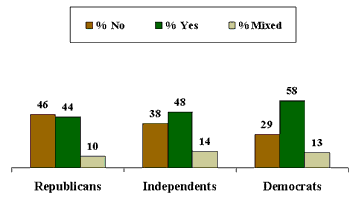 |
| July 5-8, 2002 |
Similarly, on the question of who is winning the war, Republicans are more optimistic about the United States' success than are independents and Democrats. By a 19-point margin, Republicans pick the United States and its allies over "neither side," while independents and Democrats pick "neither side" by margins of 16 and 13 points respectively. Democrats and independents are also more likely than Republicans to say the terrorists are winning, though the percentages expressing this view among all three groups are small.
| Who Is Winning the War on Terrorism? Compared by Party |
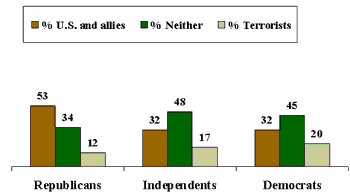 |
| July 5-8, 2002 |
Survey Methods
The latest results are based on telephone interviews with 1,013 national adults, aged 18 and older, conducted July 5-8, 2002. For results based on the total sample of national adults, one can say with 95% confidence that the margin of sampling error is ±3 percentage points. In addition to sampling error, question wording and practical difficulties in conducting surveys can introduce error or bias into the findings of public opinion polls.
Now, thinking about something else,
How likely is it that there will be further acts of terrorism in the United States over the next several weeks -- very likely, somewhat likely, not too likely, or not at all likely?
BASED ON --509-- NATIONAL ADULTS IN FORM A
|
Very |
Somewhat likely |
Not too |
Not at all likely |
No |
||
|
% |
% |
% |
% |
% |
||
|
2002 Jul 5-8 |
15 |
41 |
30 |
12 |
2 |
|
|
2002 May 20-22 |
21 |
44 |
25 |
7 |
3 |
|
|
2002 Mar 8-9 |
9 |
43 |
32 |
13 |
3 |
|
|
2001 Dec 14-16 |
17 |
45 |
27 |
8 |
3 |
|
|
2001 Nov 2-4 |
24 |
50 |
16 |
6 |
4 |
|
|
2001 Oct 19-21 |
40 |
45 |
10 |
3 |
2 |
|
|
2001 Oct 7 ^ † |
41 |
42 |
9 |
4 |
4 |
|
|
2001 Sep 21-22 † |
22 |
44 |
24 |
8 |
2 |
|
|
^ |
Polls conducted entirely in one day, such as this one, are subject to additional error or bias not found in polls conducted over several days. |
|||||
|
† |
WORDING: How likely is it that there will be further terrorist attacks in the United States over the next several weeks -- very likely, somewhat likely, not too likely, or not at all likely? |
|||||
How likely is it that there will be further acts of terrorism in YOUR COMMUNITY over the next several weeks -- very likely, somewhat likely, not too likely, or not at all likely?
BASED ON --504-- NATIONAL ADULTS IN FORM B
|
Very |
Somewhat likely |
Not too |
Not at all likely |
No |
|
|
2002 Jul 5-8 |
4% |
13 |
34 |
48 |
1 |
|
2002 Mar 8-9 |
2% |
10 |
35 |
52 |
1 |
|
2001 Nov 2-4 |
3% |
20 |
41 |
32 |
4 |
Who do you think is currently winning the war against terrorism -- [ROTATED: the U.S. and its allies, neither side, or the terrorists]?
|
U.S. and |
Neither |
The |
No |
|
|
% |
% |
% |
% |
|
|
2002 Jul 5-8 |
39 |
43 |
16 |
2 |
|
2002 Jun 21-23 |
33 |
49 |
14 |
4 |
|
2002 May 28-29 |
41 |
35 |
15 |
9 |
|
2002 Apr 22-24 |
47 |
39 |
10 |
4 |
|
2002 Mar 22-24 |
51 |
35 |
12 |
2 |
|
2002 Mar 4-7 |
53 |
34 |
10 |
3 |
|
2002 Jan 7-9 |
66 |
25 |
7 |
2 |
|
2001 Dec 6-9 |
64 |
28 |
5 |
3 |
|
2001 Nov 8-11 |
53 |
33 |
11 |
3 |
|
2001 Oct 11-14 |
42 |
44 |
11 |
3 |
Which comes closer to your view -- [ROTATED: the U.S. accomplishments in Afghanistan will be a success even if Osama bin Laden is not captured, (or) the U.S. accomplishments in Afghanistan will not be a success until Osama bin Laden is captured]?
|
|
|
|
Both/Neither (vol.) |
No |
|
2002 Jul 5-8 |
38% |
50 |
8 |
4 |
|
2002 Jan 11-14 |
44% |
50 |
4 |
2 |
|
2001 Nov 26-27 |
41% |
55 |
2 |
2 |
